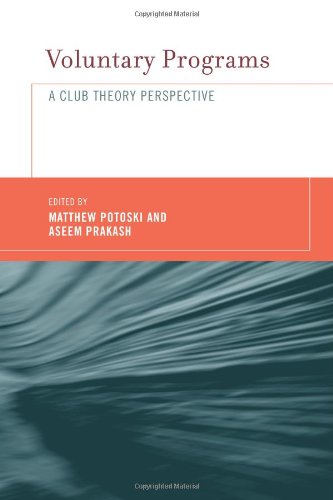

Most ebook files are in PDF format, so you can easily read them using various software such as Foxit Reader or directly on the Google Chrome browser.
Some ebook files are released by publishers in other formats such as .awz, .mobi, .epub, .fb2, etc. You may need to install specific software to read these formats on mobile/PC, such as Calibre.
Please read the tutorial at this link. https://ebooknice.com/page/post?id=faq
We offer FREE conversion to the popular formats you request; however, this may take some time. Therefore, right after payment, please email us, and we will try to provide the service as quickly as possible.
For some exceptional file formats or broken links (if any), please refrain from opening any disputes. Instead, email us first, and we will try to assist within a maximum of 6 hours.
EbookNice Team

Status:
Available4.5
32 reviews
ISBN 10: 0262162504
ISBN 13: 9780262162500
Author: Matthew Potoski, Aseem Prakash
The recent growth of voluntary programs has attracted the attention of policymakers, nongovernmental organizations, and scholars. Thousands of firms around the world participate in these programs, in which members agree to undertake socially beneficial actions that go beyond the requirements of government regulations, such as following labor codes in the apparel industry, adhering to international accounting standards, and adopting internal environmental management systems. This book analyzes the efficacy of a variety of voluntary programs using a club theory, political-economy framework. It examines how programs' design influences their effectiveness as policy tools. It finds that voluntary programs have achieved uneven success because of their varying standards and enforcement procedures.
The club theory framework views voluntary programs as institutions that create incentives for firms to incur the costs of taking progressive action beyond what is required by law in exchange for benefits that nonmembers do not enjoy (such as enhanced standing with stakeholders). Voluntary Programs develops this theoretical framework and applies it to voluntary programs sponsored by industry associations, governments, and nongovernmental organizations, organized around policy issues such as "blood diamonds," shipping, sweatshops, and the environment. The wide diversity of cases -- across sectors, sponsoring organizations, and objectives -- provides valuable applications of the club framework, generates new insights for future research, and offers practical guidance for designing effective programs.
b club volaris
volunteer theory
examples of voluntary and involuntary groups
club vs program
ucla volunteer club
Tags: Matthew Potoski, Aseem Prakash, Voluntary Programs